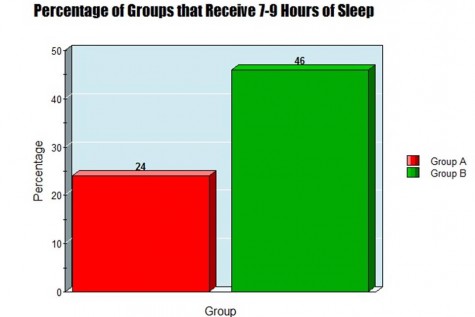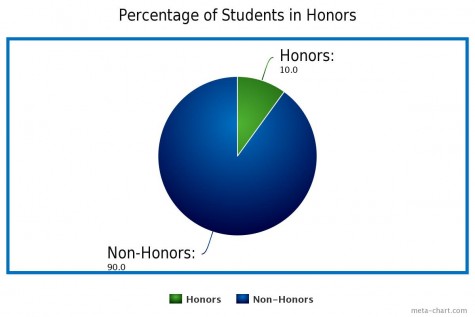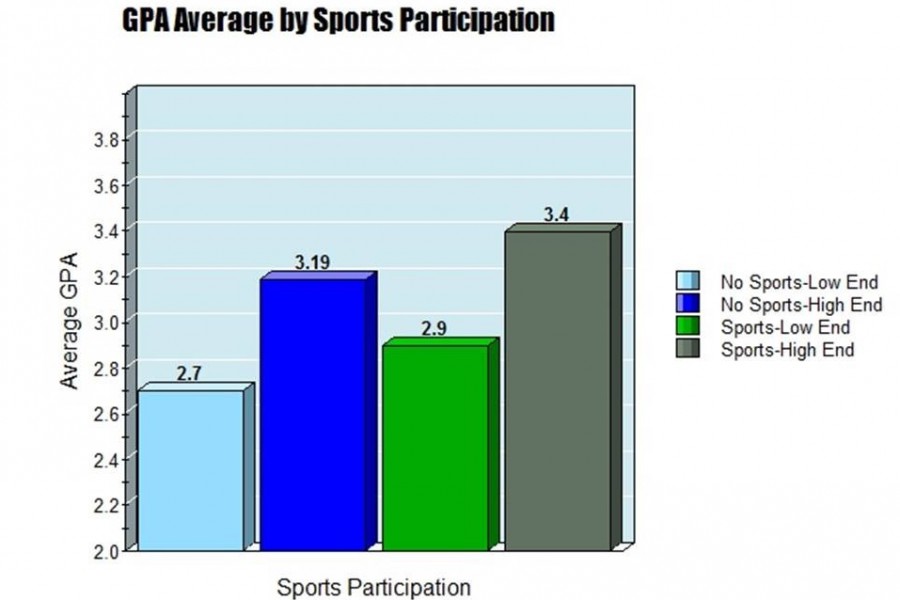Survey shows factors that lead to better grades
Athletes, students who get sleep have higher GPAs
IMAGE / Aaron Haack
This bar graph shows the average GPA of students who do and do not play sports. Each category shows the low and high end of the average.
When it comes to carrying a high GPA, two factors stand out among students — being an athlete and getting a proper night’s rest.
The Eclipse conducted a survey of the student body a few weeks ago in order to determine if there are trends between common outside factors and overall GPA,
Once the data was collected and analyzed, certain trends emerged.
The clearest trend was that students who played sports tended to have a higher GPA than students who did not play sports. Athletes had an average GPA of 2.9 to 3.4; whereas, students who did not play sports had an average of 2.7 to 3.19.
In order to make macroscopic comparisons, the students were divided into two groups: Group A, which consisted of students with GPAs ranging from 0.0 to 2.99, and Group B, which consisted of students with GPAs ranging from 3.0 to 4.0+.
A trend is visible between sports participation and GPA. Group B has a higher percentage of athletes than Group A, as well as a higher GPA than Group A.
This observed trend is supported by the averages of students who do and do not play sports, since students who play sports tend to have a higher GPA overall.
Besides playing sports, sleep seems to be important to getting better grades.
Only 24 percent of Group A and 46 percent of Group B got the recommended seven to nine hours of sleep. This suggests that sleeping more helps students get better grades.

This bar graph shows the percentage of each group that received 7-9 hours of sleep per night. Group A has GPAs from 0.00-2.99. Group B has GPAs from 3.0-4.0+.
“I think sleep is beneficial to your grades because then you won’t fall asleep in class,” sophomore Aubrey Scott said.
From another perspective, 76 percent of Group A and 54 percent of Group B get only four to six hours of sleep per night. This supports the direct relationship between hours of sleep and GPA.
Sophomore Sarah Streit thinks that this relationship makes sense because getting less sleep is detrimental to students’ grades.
“I think that less sleep hurts your grades because your brain can’t function at its full potential,” Streit said.
The Eclipse did not find a substantial correlation between hours of watching TV/playing video games and GPA. Group A and B both had similar percentages for each interval of time.
However, in a surprising twist, both Group A and Group B had nearly identical percentages of students who had a job. Group A and B had 25 and 26 percent of students who had a job, respectively.
Many students found the results of the survey shocking.
“I think it’s surprising that students who play sports have a higher GPA,” Erin Davis, sophomore, said.

This pie chart shows what percentage of the school participates in the honors program. The survey reflected this by choosing 10 percent of those surveyed from honors courses.
The survey was given to 25 students from each grade level. In order to mirror the student body more accurately, three students from each grade level were chosen from an honors or Advanced Placement course. This figure reflects the 10 percent of students who take honors or AP courses.
Each student was asked the following questions:
- How many hours of sleep do you get each night on average?
- How many hours each night do you spend playing video games/watching TV?
- Do you like your teachers?
- Do you have a job?
- Do you play sports?
- Are you in a relationship?
- What range does your GPA fall in? (answers given in increments of 0.5)
The surveys were all anonymous and confidential in order to protect the privacy of students.

Class: Senior
Clubs: Forensics, Debate
Hobbies: Reading, Solving Rubik's Cubes, Playing online games, Visiting pointless websites
Future Plans:...

Class: Senior
Clubs: National Honor Society
Sports: Bowling
Hobbies: Bowling, Tutoring, Playing video games, Knowing random things
Future Plans:...












Carol Ragusa • Mar 10, 2015 at 7:35 pm
Very interesting article. It is well developed with excellent support data.
I would add that most serious student athletes are aware that top universities draft only top arhletes who also maintain a high GPA.